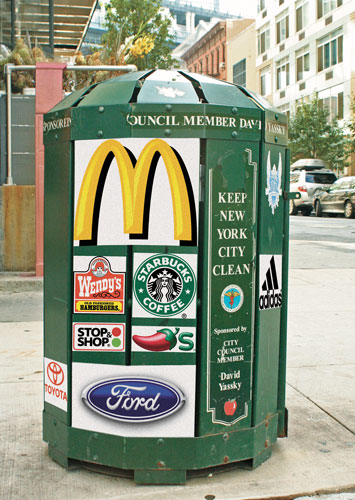As if advertising wasn’t trashy enough, a city councilman now wants to sell ad space on city garbage cans, saying that the plan could reap $2.5 million.
“The city already generates significant revenue from selling ad space [on other street furniture],” said Councilman David Yassky (D-Brooklyn Heights). “There’s no reason not to sell it on our trash cans when there are companies that will pay to put ads there.”
Under the plan, the city would sell ad space on the roughly 25,000 cans, generating about $100 per receptacle per year, Yassky said.
Selling ad space in the same place that people toss leftovers, litter and dog poop is feasible, said Gene Secunda, an advertising executive and New York University marketing and advertising professor — though he was quick to link the idea to other proposals like a Texas school district that now sells ads on the sides of its buses.
“Yassky’s proposal seems as fitting as many other cash-strapped municipalities’ proposals,” Secunda said.
The proposal comes as the city is in the midst of a recent 20-year deal with the Spanish company Cemusa to install newsstands, public toilets, and other street furniture at no cost to the city because the amenities are paid for by the advertising.
Trash cans are not part of the Cemusa deal. Not yet, Yassky said.
But if ads greet us on the subway and buses, what comes next? Audio advertisements on garbage cans that remind passersby to recycle? Ads on the backs of city workers’ uniforms? Video ads in the taxicabs (oh, wait, that one already happened)?
The possibilities, of course, are endless because, Secunda said, nothing is sacred.
“Everything is for sale in these difficult economic times,” he said.
The garbage can advertising would also eliminate the awkward placement of councilmembers’ names on sponsored cans within districts, Yassky added. Currently, councilmembers’ allocate tax dollars for fancier garbage cans — but the city then emblazons the councilmembers’ names onto the cans.
Yassky calls the practice “inappropriate” because it looks like free advertising for something he should be doing as part of his job anyway.
(Yassky wrote to Sanitation Commissioner John Doherty last year to ask that his name be removed form the trash cans in his district, and elected officials are now asked whether or not they want their names on the wastebaskets, said agency spokeswoman Kathy Dawkins.)
Not everyone is in favor of the ad proposal. More advertising would just further clutter the city and hardly make a dent in the city’s finances, said the founder of the Anti-Advertising Agency, an artist collective.
“I think that $2.5 million sounds like a lot of money, especially when the banks are tanking, but it’s … like a drop in the bucket” compared to the city’s $60-billion budget, said Agency founder Steve Lambert. “Putting more ads in the city doesn’t make the city more livable.”






















